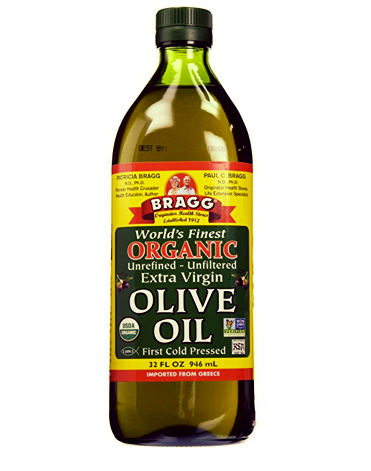The Easy Guide to Cancer-free Cooking Oils
Did you know that if used with the wrong heat, cooking oils can become carcinogenic (a.k.a. potentially cause cancer)? I didn’t, either.
Here I was, cooking with various oils for my entire adult life and la-di-da not giving it any thought. Until BOOM, my Ayurveda teacher informed me that certain oils with very low smoke points should really only be used for things like salad dressings. WHAT?! Mind officially blown.
Granted, this is not news by any means. Different oils have different smoke points and these are often included on the product label (but not always) as "medium heat," "medium-high heat," etc. But it's not something typically discussed in recipes, and if you Google it, there's a ton of conflicting answers on what oil smokes at what temperature. And as with everything on food packaging, it takes a whole lot of research to figure out the real deal.
In addition to smoke points, there are a few more important terms and tips to know when it comes to cooking oils… So, here’s the skinny on oils, what to look for, what to chuck and how to use them, with advice from Registered Dietitian Nutritionist Dana Nahai of NourishED Food & Wellness Education:
The 5-second cheat sheet:
Make unrefined, organic and cold-pressed or expeller-pressed cooking oils your go-tos in the kitchen.
Reduce the frequency of refined cooking oils.
Throw away canola oil, vegetable oil, corn oil, soybean oil, lard and vegetable shortening.
Buy these five staples for your pantry:
Extra-virgin, Expeller- or Cold-pressed, Unrefined, Organic Olive Oil (medium heat)
Organic Ghee (high heat)
Organic, Extra-virgin, Unrefined Coconut Oil (medium heat)
Organic, Expeller- or Cold-pressed Avocado Oil (medium-high heat)
Refined Safflower Oil (high heat)
The 5-minute read:
Why should you care about oil smoke points?
A smoke point is the point at which an oil begins to smoke...um, obvi. But what’s not obvious is that it means the oil is decomposing under too-high heat. "Smoking fat begins the formation of free fatty acids which are known to cause inflammation and promote cancer growth in the body," says Nahai. So, the antioxidants that are wonderful for you in that beloved grape-seed oil, for example, are now changing into harmful free radicals and toxins. Great.
Nahai adds, "The shape of the cooking pan will also affect smoke point; a sauté pan with sloping sides allows more oxygen to reach the fat versus one with vertical sides."
What TEMPERATURE IS CONSIDERED LOW, MEDIUM AND HIGH?
Low: 255-250°F
Low/Medium: 250-325°F
Medium: 325°F
Medium/High: 325-450°F
High: 450-500°F
WHAT'S better: refined or unrefined cooking oils?
To understand this, you need to understand the process of how the oil is extracted from the seed or nut.
"Oils are extracted from seeds or nuts either through mechanical pressing (expeller pressed, cold pressed) or a petroleum hexane extraction. After the oil is extracted, it can be further refined through distillation to remove solids. This additional refinement allows oils to be heated at higher temperatures," Nahai explains.
In general, “unrefined” oils are better. Choose expeller- or cold-pressed labeled oils as your primary cooking oils. They maintain better flavors and more nutrients. However, the unrefined set typically isn't good for high-heat cooking since most have lower smoke points.
“Refined” on the label of your cooking oil means it’s been more heavily processed. Basically, the product has gone through a crazy high-tech process to extract the oil from the seed that may entail chemicals, bleaching, deodorizing and heating to high temps. "Cooking oils that have been chemically extracted using petroleum based hexane must be refined through distillation to remove any residual chemical solvent. This distillation requires the oil to be manufactured at very high temperatures, which denatures many of the healthier components of the oil," Nahai says. For the foodies out there: They also don’t taste great.
SO WHAT DOES "NATURALLY REFINED" MEAN THEN?
Right? Can't these product labels just simplify their terms already? Let's call these guys somewhere in the middle between the awesome "unrefined" and the not-so-bueno "refined." Nahai breaks it down: "Naturally refined oils are those that are mechanically (cold, expeller) pressed but further refined to have small particles removed and increase the temperature to which the oil can be heated. These oils may be refined using a system of filters which result in a 'naturally refined' product. Mechanically extracted oils may also be treated with various chemical washes, which result in a 'refined' product."
SO What are the best cooking oils TO USE THEN?!
Here's are the five essentials you need in your pantry:
1. Extra-virgin, Expeller- or Cold-pressed, Unrefined, Organic Olive Oil
Smoke point: Medium
How to use it: Olive oil is pretty versatile. Use it in salad dressings or it "is great for sautéing [on medium heat] and roasting vegetables and meats," Nahai says.
There is a lot of conflicting literature about olive oil out there, but here's what Nahai says, "The mechanical processing of extra virgin olive oil keeps the integrity of this concentrated source of omega-9 fatty acids, and it’s medium smoke point offers a range of versatility for healthy cooking. Olive oil does not have a low smoke point. When the smoke point of olive oil (light, virgin or extra virgin) is referred to as 'low,' what is actually meant is that the point at which it burns is lower than 'high.' All olive oil is perfectly fine for sautéing or roasting, but not for pan searing or frying."
2. Organic Ghee
Smoke point: High
How to use it: "Ghee can be used for high-heat cooking or lower," Nahai says. Use it for pan-searing a roast, making popcorn, sautéing and roasting meats and vegetables. It offers a rich flavor like butter, and has some major gut benefits.
3. Organic, Extra-virgin, Unrefined Coconut Oil
Smoke point: Medium
How to use it: Sautéing and roasting meats and vegetables. It does have a distinct coconut-y taste, but I've found that's subdued when you are using a lot of spices, such as when cooking Asian dishes.
4. Organic, Expeller- or Cold-pressed Avocado Oil
Smoke point: Medium high
How to use it: Salad dressings, sautéing and roasting meats and vegetables. (Some people say it has a distinct avocado taste, but I've found it's rather nondescript and like it for when I want to take things a bit hotter than olive or coconut oil allows.)
5. Refined Safflower Oil
Smoke point: High
How to use it: For the occasion of turning up the heat, such as pan-searing a roast—and should you want an alternative to ghee—choose a heavy-duty refined fat. "I keep a small bottle of neutral-flavored, expeller-pressed, refined safflower oil for this job," Nahai explains.
So what about your peanut oil, sesame oil and other cooking oils you love? Use those either for low or no heat like for making sauces, salad dressings or drizzling. Or, buy the "refined" version for higher-heat menu prep and use it sparingly.
Oils to throw out sooner rather than later:
"Oils to avoid or use least often are the inexpensive vegetable oil blends which are highly inflammatory in the body," Nahai says. These include canola oil, vegetable oil, corn oil, soybean oil, lard and vegetable shortening. These cheap veg oils are either mostly genetically modified (GMO), contain the most unhealthy saturated fats (heart attack in the making!) and/or trans fats (even worse). We get enough of this stuff through the processed foods we eat anyway—why not choose something better for home cooking?
also worth knowing...HERE'S how long the good oils last:
One year.
Oil that has been in your pantry longer than 12 months has started to deteriorate and go rancid. "Rancid fats not only taste bad, but also prevent the absorption of fat soluble vitamins and have a higher concentration of free radicals, which promote the growth of cancer," Nahai explains. To prevent rancidity, store oils in a cool, dark cabinet or corner of your pantry. Don’t ever keep your oils next to the oven or stove! Delicate nut oils (walnut, pistachio, pecan, etc.) can be stored in the refrigerator. Also to note: the healthy ones go rancid more quickly.
Have another question about cooking oils? Please let us know in the comments below!









